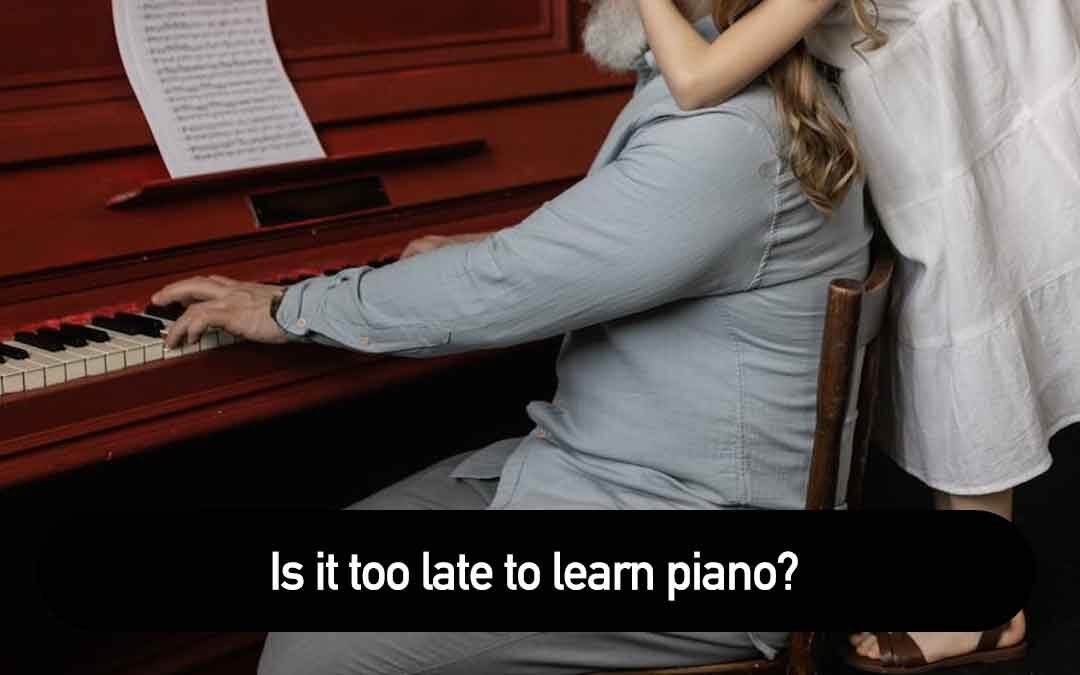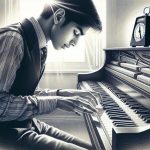Is it too late to learn piano? Well, as they say, It is always possible to learn something. Life has ample opportunities to offer when we decide what is best for us and what we want to do.
Likewise, learning a new skill or starting a hobby is always independent of age, even if it's about learning music or a musical instrument. If someone is keen to learn music, they can start learning it at any age. Then, moving further, let's learn about the various benefits, ways to proceed, the barriers crossed, and much more when people of all ages and all walks of life start piano lessons.
Piano Lessons for all ages
Age is never a barrier to learning something new. Especially to start piano lessons, the first and foremost thing is to make up your mind and just get started. Usually, we only pursue a hobby or interest for various reasons like lack of time, resources, prior engagements, studies, work, etc.
But to learn to play piano, you must choose a good instrument, get a good piano teacher and begin piano lessons, regardless of age.
Playing music - the perfect getaway to peace.
Playing music is an ideal activity for all ages, which helps you manage stress, improve your social skills, and uplift your mood with an abundance of happy and positive thoughts. It's your best escape from the daily mundane life and chaos.
Starting Piano lessons
When younger students begin piano lessons early, it is more of a learning through concepts, notes, chords, etc.
Young kids learn piano more like a subject and gradually move towards making it a hobby. In contrast, adult piano students are more likely to start it as an interest or a hobby and thus get more immersed in its feel and vibe than just learning it at the surface level.
Advantages of playing piano for adult students
While it's true that playing piano helps children in many ways, be it their overall growth or the development of their senses, there are equally important benefits for adult piano students as well.
Intellectual and Cognitive Benefits
When you start piano lessons, its mellow music and healing vibes increase brain activity, enhance creativity, and improve memory by relaxing your senses.
Reduces Stress, Anxiety, and depression
Playing music is a form of meditation that helps adult students to balance their stress and improve their efficiency. Music, especially playing piano, can also become a magical way to treat ailments like depression.
Playing the piano has some scientific benefits as well.
It helps in improving your hearing and listening skills, cognitive and mathematic skills, while also largely improving your memory. It is also proven to enhance IQ and help in developing hand-eye coordination.
While the long list of advantages holds, the big fact remains that the amount of feeling the grown-ups can invest in learning music is much more than their young counterparts as it refines and grows over age.
The depth of understanding music and its wide applicability has evolved over the years; thus, age can be an edge over younger students.
Learning piano at various stages in life
College Life
When adults start college, they get ample opportunities to learn music and explore their creative side by playing a musical instrument. They get the platform to learn and to perform in events in addition to their professional studies. All colleges and professional institutes provide a platform to help them harness their musical side.
Professional/ Corporate Life
When an individual enters a professional life, work-life balance plays an enormously important role in maintaining a healthy lifestyle and sanity of mind. Starting a new hobby like music lessons or learning musical instruments from a professional music teacher helps them develop a new skill and, in addition to that, helps them balance the stress and chaos of their work life.
Post Retirement
It is said that age is just a number, and many people plan to learn music when they retire to have ample time to invest in a new skill like playing piano. Activities like learning to play the piano help stimulate brain cells and help to keep your mind active and vibrancy going on even in your second inning.
The only thing that could be important to consider for elderly persons while learning piano is that it might take some more time and effort for them, but remember, in the end, it would be much more fruitful than you thought.
Learning piano at any age helps develop patience and perseverance, which helps you meet a better version of yourself. Learning piano at an older age also helps in being focused and disciplined, as learning requires a lot of concentration and hard work.
Playing piano is a self-care, which everyone should focus on to maintain a better life and move away from the chaos and the regular hustle-bustle of mundane life.
Learning piano at a later stage in life
Playing the piano actually makes you smarter, happier, and more focused.
It helps in sharpening memory.
Piano playing is a learning process that helps our brain function more efficiently. Studying piano helps in enhancing the working memory of adults. Studies have shown that playing the piano may improve our brain's thinking ability.
Developing Aural skills
Aural skill is the ability to understand the sounds we make and hear. Piano playing and taking piano lessons help develop a musical ear, which further helps develop these skills.
Maintaining concentration and being focused.
Any musical journey requires focus and concentration, whether playing piano, guitar, or any other instrument. And piano students multitask while playing piano, remembering the chords, and focusing on rhythm, tempo, pitch, melody, and everything simultaneously. Thus they are more focused and attentive.
Building fine motor skills
Playing the piano encourages one's inclination to move and develop fine motor skills and gross motor skills. Piano lessons help build hand and eye coordination in children and adults.
Increased finger grip
This is helpful, especially for older people, as learning and playing piano improves the finger grip and strengthens the arm muscle.
Teaches hard work, patience, and perseverance
Playing piano requires knowledge, focus, and concentration; learning the basics takes time, practice, and a little more hard work. When we put in so much effort and hard work, we automatically develop skills like patience and perseverance. Yes, Piano students are quite hard working.
Effectively dealing with stress and anxiety.
Due to the hustle and bustle of work and life, many people suffer from stress and anxiety. Playing the piano is effective in relaxation and stress management. It overcomes negative emotions and depression in older people.
Healing
Any learning process, be it piano lessons or music theory, helps heal the soul by distracting from the negative environment and increasing the overall positive vibes.
Facing the world with more confidence
Playing the piano helps to overcome shyness; it is a very effective way of expressing your thoughts with music without speaking or communicating directly with the audience. Learning piano is a musical journey, and your confidence increases as and when you take a step ahead.
Feeling of contentment and happiness from within
Learning piano not only reduces negative emotions but also increases the positivity in an individual. The positive emotions make you feel happy from within. When you play the piano, you feel content and satisfied from within.
Societal
At any stage in life, one must go out, meet and interact with people. Music has the power to help connect people. Several benefits of playing piano can help a person gel well with society as a whole.
- Meeting new people with the same interests and genre.
Playing piano connects you to people worldwide with similar interests in music. It helps you connect with people who understand music, especially the music teacher.
- Being part of a devotional or a musical group of people who play piano
People who play piano are more likely to meet like minded people who play piano or a musical instrument and are part of some devotional, religious groups or a band/ musical group. This gives a chance to participate and be a part of some event or a musical group.
- Being more outgoing and extrovert
It is obvious that when you meet people, you are likely to become more extroverted and outgoing.
- Feeling of contentment and happiness from within
Success and achieving something in life, be it pursuing a hobby like playing the piano, gives a sense of fulfillment and happiness.
- Above all, playing piano relaxes the mind and the soul.
In this era of corporate work life, it is important to relax and unwind; your mind also needs rest. Playing the piano diverts not only your mind but also rejuvenates your soul.
- Positive effect on the life of other people
Our actions and reactions affect other people as well. Your happiness and your positive thoughts have an optimistic effect on the other person as well.
Challenges one might face
While we talk about a host of benefits and advantages of learning to play piano, there are a few challenges as well, faced by people at later stages in their life.
- The biggest challenge while trying to learn piano is finding time from their busy schedules
- Family responsibilities
- Having a bad work life balance
- Health issues that require intensive care
- Finding a good music teacher
- Motivation and support from loved ones
- Lack of resources
Bottom line
But as they say, once you decide, there's no looking back. So get going, step out and buy a new piano for yourself - digital piano or acoustic piano. Don't fear your age, and don't think you're a misfit; don't care about what the world would say.
Enroll for private lessons and trust that good musical education will help you add a new skill and explore a new side of yourself. So, don't hesitate, don't stop; do it.
Related Topics
- Learn How To Play Keyboard Synthesizer
- Piano Easy Songs With Letters
- One Hand Piano Songs That You Can Practise
Harlan Kilstein began playing piano during covid with no piano background at all. He taught himself how to play learning what to do and what not to do.
Today he's an advanced intermediate player and can help you grow in your skills because he learned all this on his own.








